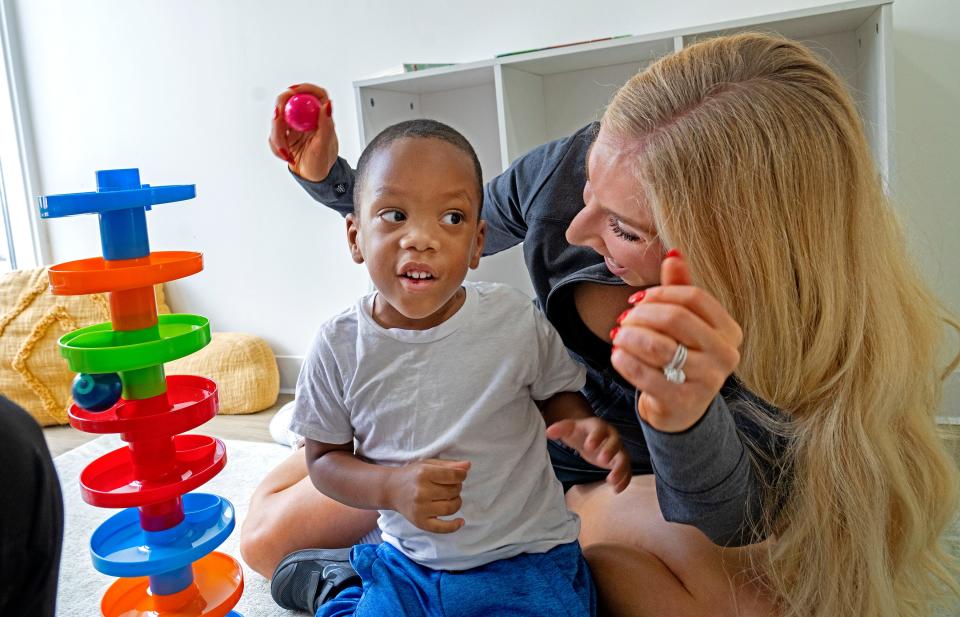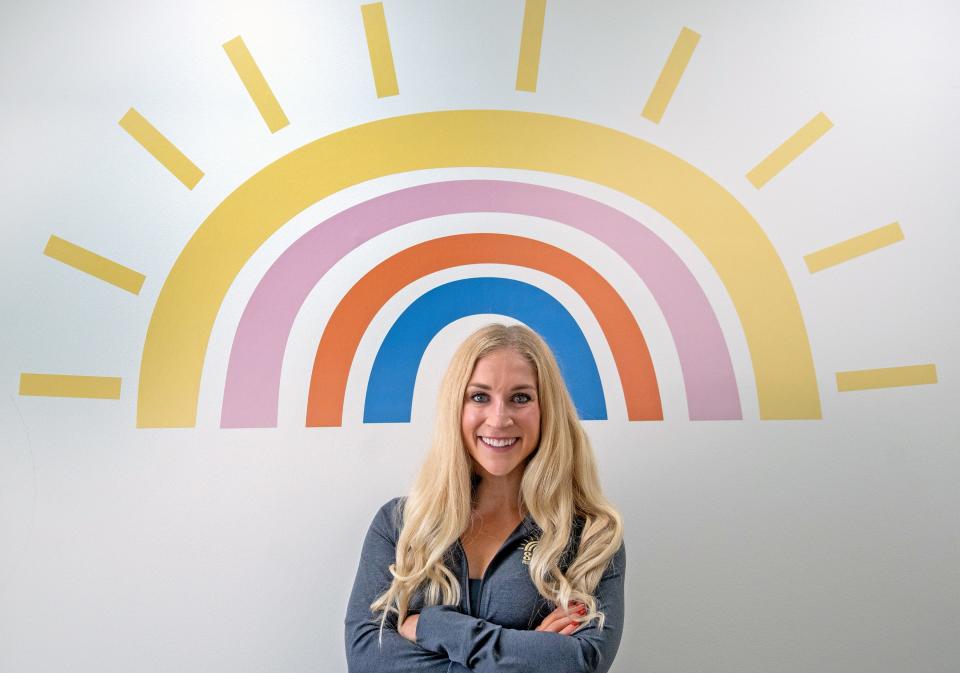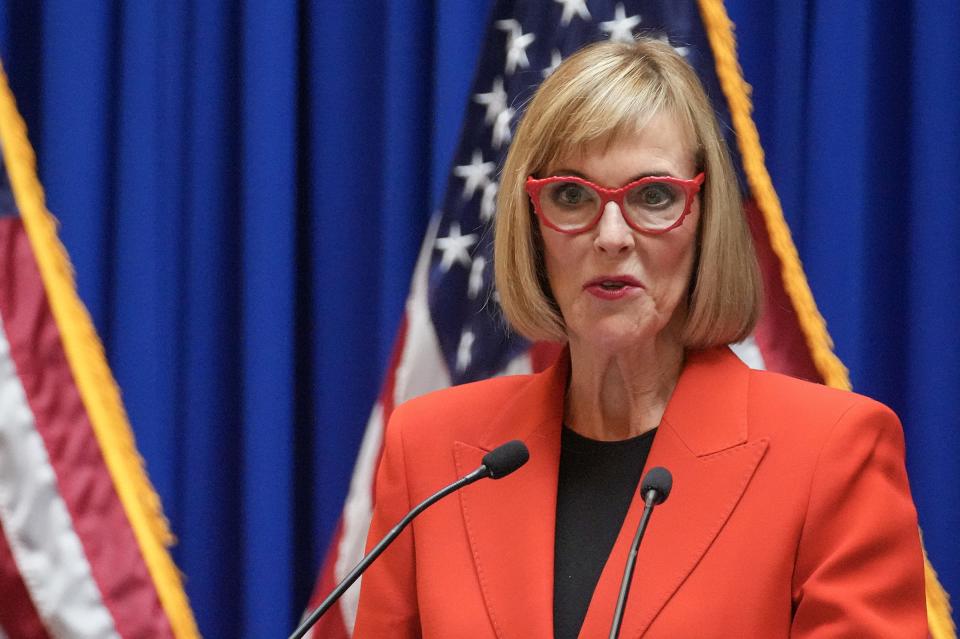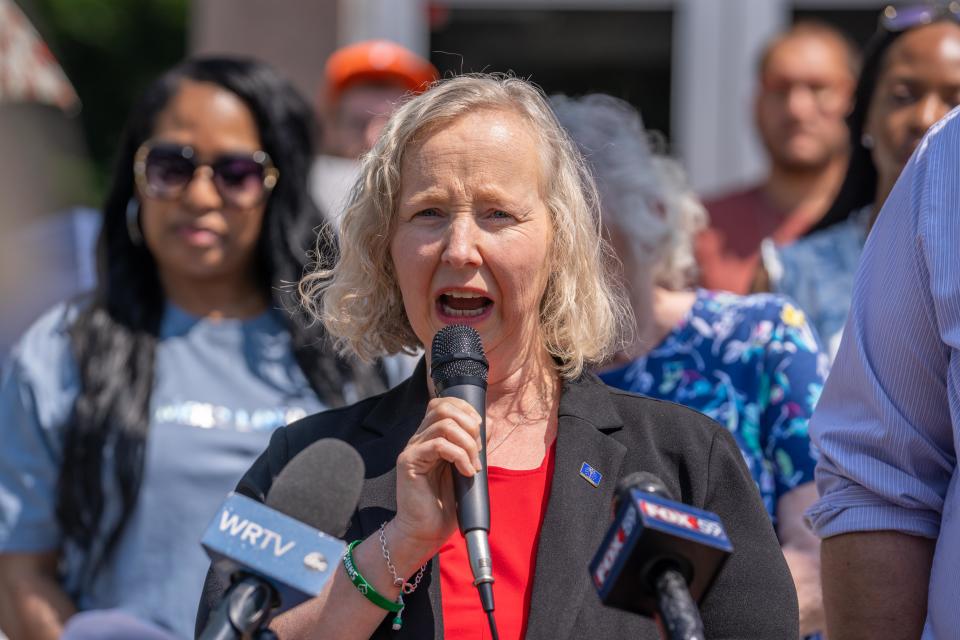'Rippling effect': Autism therapy providers fear drastically lower proposed Medicaid rates
Even before Rain Parker received a diagnosis of autism, Keshell Bell was worried about her toddler.
“Ready, set, go” was the extent of his vocabulary, and his day care teachers struggled with his behavior. A developmental psychologist gave Bell a list of autism treatment centers that accepted Medicaid coverage, and Bell chose the one closest to her home, bracing for a stressful parenting journey.
Half a year later, Rain is a different child, a transformation that Bell attributes to Shine Pediatric Therapy, the Applied Behavioral Analysis clinic that Rain attends for about eight hours a day.
“Oh my goodness, they’re lifesavers,” Bell said. “I did not think that he would be developing the way he is. He’s catching on to everything so fast…. Now he repeats everything that you say.”

But Bell fears what might happen if the state goes through with a plan to rein in Medicaid’s soaring budget for this specific kind of treatment, known as ABA therapy. To contain costs, the Families and Social Services Administration, which oversees Medicaid, is proposing standardizing rates for the therapy at a level that many providers worry could threaten their ability to continue providing these services. FSSA disputes this, saying the rate they came up with is based on providers' own cost data. That's true, but FSSA is proposing rates at the low end of a wide scale.
Currently, the hourly reimbursement providers receive from the state varies from $46 an hour to five times that. The average is $91 an hour.
Now the state is proposing instituting a flat rate of $55 an hour for the most common form of therapy ― meaning, in comparison to what the providers have been accustomed to receiving, a small handful of providers would get a bump, but most would experience a dramatic decrease.
Providers, too, agree that there needs to be a standardized rate. But choosing $55, as FSSA is proposing, goes too far, too quickly, they argue.
"I definitely think there’s some middle ground, but what we're experiencing now, if these in-center ABA therapy centers are to close, they (the children) are going to be pushed into the school system that’s already overwhelmed," said Hillori Wanninger, a board certified behavior analyst with Shine Pediatric Therapy. "This is a very rippling effect."
Providers, families and even state lawmakers ― including the lieutenant governor ― are raising the alarm because if the proposal becomes reality, many say, clinics such as Shine may have to layoff staff or reduce salaries to make ends meet, which in turn would render them unable to provide therapy to as many children.
Angie Schlueter's 13-year-old son started ABA therapy at 5 years old and will likely stay in it as long as he's allowed. Sean was completely nonverbal and not potty-trained before entering; within a week, he could use a toilet and say "I love you."
Schlueter, of Marion, was able to give him a bath for the first time recently without him having an outburst and hitting her. The family is planning their first family vacation, to Myrtle Beach, in 2025.
"For the first time in our lives, we have some breathing room. We’re not constantly worrying about him harming himself or harming us," she said. "ABA cannot go away. I will be so distraught if they have to go away. I gotta have it."
State payments have ballooned
In the past eight years, the amount the state has spent on providing autism therapy to children on Medicaid has skyrocketed.The state Medicaid office started covering ABA therapy in 2016 by reimbursing providers based on a percentage of whatever each individual provider bills. The plan, FSSA secretary Daniel Rusyniak said, was to collect cost data after a few years and come up with a standard rate ― meaning every provider would get the same reimbursement for the service.
Like many things, the COVID-19 pandemic pushed off this process, and during COVID, providers say, the cost of providing care soared just as it did for other types of health care. Last year, the agency finally began collecting data to figure out what that standard rate should be.
In 2019, the state paid $120 million for ABA therapy. In 2022, it paid $420 million.
Part of that is because the number of kids requiring ABA therapy had roughly doubled. But the dollar amount spent per child also nearly doubled.
In 2019, FSSA paid $5,000 per month per child, Rusyniak said. By 2019 that had risen to $8,800 in 2022. Currently, the state pays up to $10,000 per child per month.That cost is comparable, Rusyniak said, to what the state reimburses for skilled nurses, who have a higher level of education than the registered behavior technicians providing the autism therapy. These paraprofessionals, who are overseen by board certified behavior analysts with graduate degrees, must have a high school degree, undergo 40 hours of instruction and take an exam.

When FSSA sets rates, the agency takes into account who provides the service and where it is provided among other factors, Rusyniak said.
From FSSA's perspective, it's not fair to compare the proposed rate to current reimbursement levels because the agency believes providers currently charge too much. According to a survey of 26 providers, their baseline cost of providing ABA therapy is $68 an hour
But providers argue that the rate they came up with did not include enough consideration for the cost of doing business, like administrative overhead.
Number of children with autism on rise
The number of children diagnosed with autism has been steadily increasing over the years, partially due to increased awareness of the condition. In 2010, one in 68 children were diagnosed; by 2018 that had risen to one in 44 and by this year one in 36, according to the Centers for Disease Control and Prevention.
Such numbers can already make it difficult to find open spots at clinics. In January, Tangram, a social services provider based in Indianapolis, opened a clinic to provide ABA therapy. Currently the clinic serves eight individuals, most on Medicaid, and has an additional 18 on its waitlist, said Kari Sheward, vice president of autism and behavioral health.
Setting the Medicaid reimbursement rate at the $55 level could lead clinics to turn away Medicaid families in favor of those with commercial insurance, which currently typically reimburses at a lower rate than Medicaid, some in the field say.
There are also concerns about retaining staff. The therapists work one-on-one with the students helping them hone the skills that they will need to thrive, from speech therapy to potty training to tooth brushing to feeding therapy. At Shine, where 29 out of the 30 “learners” have Medicaid coverage, registered behavior technicians make between $23 and $25 an hour, said Courtney Hodge, owner of Shine Pediatric Therapy.

If she had to lower salaries due to a $55 standardized rate, she said, many would likely opt to leave.
“It’s scary to think what other jobs they could get,” Hodge said. “I don’t think it would change anything for our current families, but it would limit the number of Medicaid families we could take in future and we would focus more on private insurance.”
In other states, such as Colorado, low Medicaid reimbursement rates have led clinics to close.
The Statehouse gets involved
Concern over the proposed policy is reverberating throughout the Statehouse.
Lt. Gov. Suzanne Crouch, who is running in the Republican primary for governor, penned a letter to Rusyniak on Aug. 18 expressing her "significant concerns" about how the proposed rate change may impact providers and families and have ripple effects on the school and health systems. She asked him to delay making a decision until all affected could reach consensus on a more "appropriate" rate.

"We have a responsibility to spend money wisely and prudently, but also to ensure appropriate care at a time in children's development in which high quality care can make a difference for the rest of their lives," Crouch wrote.
State lawmakers on both sides of the aisle, such as Rep. Becky Cash, R-Zionsville, and Rep. Kyle Miller, D-Fort Wayne, have written letters to Gov. Eric Holcomb pleading for an alternative. A grassroots coalition of families and providers, too, signed a letter to Holcomb and then rallied outside his governor's mansion last week.
Cash isn't sure where her daughter would be if she hadn't spent time in ABA therapy as a young child. After about two years, she was able to verbalize that she wanted to go to regular school. Eventually she was able to graduate high school and launch a career.
Cash can still remember the moment a few years ago, walking in the mall with her husband, when she realized that they hadn't gotten a phone call from home in a span of several hours. They could leave home and breathe.

"You don’t ever forget where you come from and where you got," she said. "This is life saving, but also life changing for these children."
Kids who lose access to this therapy may have little choice but to join public school classrooms full time before they're ready.
Early intervention for many children can allay the need for more intensive services later on in life, said Stacy Apraez, senior clinical director for Behavior Analysis Center for Autism, which has centers throughout Indiana.
"That investment in early intervention can yield millions of dollars in cost saving," Apraez said. "To me it would be money well spent in the long run for the state."
Even when children are able to attend at least part of a school day, they may still benefit greatly from ABA services. During a period of two years when Schleuter's son, Sean, was between clinics, he regressed dramatically, forgetting his potty-training, no longer speaking, becoming violent.
"My son only attends school two hours a day ― that’s all he can handle," she said. "We can’t just put him in a classroom for eight hours, that’s not gonna happen."
Cash worries this decision is coming too quickly and too drastically without considering these downstream effects. She blames the agency for not setting norms sooner.
"I’m very very concerned, on so many different levels, and I just don’t think this has been thought through," she said. "I really don’t. I get that there have been people abusing the system, but you can’t just truncate the system."
Rep. Robb Greene, R-Shelbyville, whose son spent three years attending ABA therapy full time, worries that another downstream effect could be an even worse picture for adults with autism in the workforce. Already, adults with autism have far higher unemployment rates than their peers.
Greene doesn't believe his son would be enrolled in kindergarten today if not for that therapy eight hours a day, five days a week.
"If you're robbing from the front end of that early intervention, the state's gonna have problems down the road," he said.
What's next
The proposed new rates are not final but "preliminary," Rusyniak said. FSSA opened up a comment period, and the agency is open to incorporating comments from providers into its final decision, Rusyniak said.
That decision is anticipated in September or October, after which providers would have 90 days before the new rates kick in.
Parents like Bell fear what could happen if the state does not increase the proposed rate. Bell, a newly minted hospice nurse, said she did not know what she would do if Rain could no longer attend 40 hours a week at Shine.Even more worrisome, she said, was what would happen to Rain."My main concern is him being more delayed," she said. "I don’t want anything to set him back."
Contact IndyStar state government and politics reporter Kayla Dwyer at kdwyer@indystar.com or follow her on Twitter @kayla_dwyer17.
Contact IndyStar reporter Shari Rudavsky at shari.rudavsky@indystar.com.
This article originally appeared on Indianapolis Star: Indiana floats drastic cut to Medicaid autism therapy payments

